2019-2020年人教版九年级英语 Unit6 When was it invented 重点知识
人教版初三英语上册Unit6Whenwasitinvented词句精讲精练

Unit 6 Whenwas it invented ?词句精讲精练【精】1. invent(1) invent 作,意“ 明;造”。
例如:Edison invented the light bulb.迪生明了灯。
(2) invent 可以表示“虚构”。
例如:The whole story was invented.整个故事是虚构的。
(3) invent 的名形式有两个,一个是 inventor (明者;明家),另一个是 invention (明物)。
例如:Edison is a great inventor in history.迪生是史上大的明家。
Human history is also a history of great inventions.人的史也是一个大明的史。
【拓展】invent 和 discover 辨析(1) invent 意“ 明,明之物”指“从无到有”。
例如:Alexander Graham Bell invented the telephone in 1876.山大·格雷厄姆· 在 1876 年明了。
(2) discover 意“ ”,指“本来就已存在,但不人知”的事物。
例如:Columbus discovered America in 1492.哥布在1492 年了美洲。
2. for examplefor example 意“例如”,“ 例” 明,而且一般只同人或物中的一个作插入,且用逗号隔开。
for example 可置于句首、句中或句末。
例如:There are many kinds of pollution, for example, noise is a kind of pollution.有多种染方式,例如噪音就是一种染。
Many students like playing computer games , for example , Mike.多学生喜玩游,比如克。
九年级英语全册-Unit-6-When-was-it-invented?知识点总结-(新版)人教新目标版

Unit 6 When was it invented? 【重点单词】1. project n. 项目,工程;2. pleasure n. 高兴,愉快;3. daily adj. 日常的,每日的;4. mention v. 提到,说到;5. nearly adv.几乎,差不多;6. boil v. 煮沸,烧开;7. remain v. 保持不变;剩余;8. national adj.国家的,民族的;9. low adj.低的,矮的;10. translate v. 翻译;11. lock v.锁上;n. 锁;12. sudden adj. 突然的13. crispy adj. 脆的;酥脆的;14. salty adj. 咸的;15. sour adj. 酸的,有酸味的;16. customer n. 顾客。
17. Canadian 加拿大的,18. divide v. 分开,分散;19. hero n 英雄,男主角;20. professional adj. 职业的,专业的;【重点词组】1. shoes with special heels 特殊后跟的鞋子2. hot ice cream scoop 热的冰其淋勺子3. run on electricity 电动的4. be used for 被用作5. the subject for my school project 学校项目的课题6. our daily lives 我们的日常生活7. have a point 有点道理8. by accident 偶然,意外地9. over the open fire 在火堆上10. fall into the water 落入水中11. take place 发生12. without doubt 毫无疑问13. at a low price 以一个很低的价格14. translate the book into different language 把书翻译成不同种的语言15. all of sudden 突然16. by mistake 错误地17. a much-loved and active sport 一个深受喜爱并且积极的运动18. divide…into 把…分开19. stop sb. from doing sth. 阻止某人做某事20. look up to 钦佩,仰慕21. the professional basketball groups 职业篮球机构22. use someone else’s idea 借用其他人的想法【重点句式】1. I think the TV was invented before the car. 我认为电视是在轿车之前发明的。
人教版九年级英语《Unit6Whenwasitinvented?》SectionA说课稿1
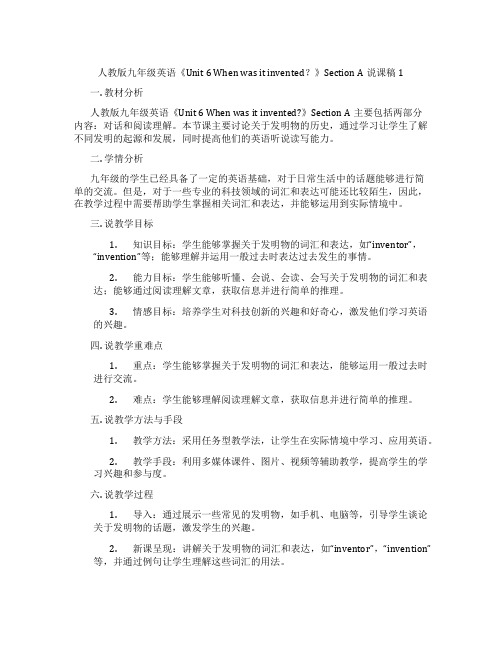
人教版九年级英语《Unit 6 When was it invented?》Section A说课稿1一. 教材分析人教版九年级英语《Unit 6 When was it invented?》Section A主要包括两部分内容:对话和阅读理解。
本节课主要讨论关于发明物的历史,通过学习让学生了解不同发明的起源和发展,同时提高他们的英语听说读写能力。
二. 学情分析九年级的学生已经具备了一定的英语基础,对于日常生活中的话题能够进行简单的交流。
但是,对于一些专业的科技领域的词汇和表达可能还比较陌生,因此,在教学过程中需要帮助学生掌握相关词汇和表达,并能够运用到实际情境中。
三. 说教学目标1.知识目标:学生能够掌握关于发明物的词汇和表达,如“inventor”,“invention”等;能够理解并运用一般过去时表达过去发生的事情。
2.能力目标:学生能够听懂、会说、会读、会写关于发明物的词汇和表达;能够通过阅读理解文章,获取信息并进行简单的推理。
3.情感目标:培养学生对科技创新的兴趣和好奇心,激发他们学习英语的兴趣。
四. 说教学重难点1.重点:学生能够掌握关于发明物的词汇和表达,能够运用一般过去时进行交流。
2.难点:学生能够理解阅读理解文章,获取信息并进行简单的推理。
五. 说教学方法与手段1.教学方法:采用任务型教学法,让学生在实际情境中学习、应用英语。
2.教学手段:利用多媒体课件、图片、视频等辅助教学,提高学生的学习兴趣和参与度。
六. 说教学过程1.导入:通过展示一些常见的发明物,如手机、电脑等,引导学生谈论关于发明物的话题,激发学生的兴趣。
2.新课呈现:讲解关于发明物的词汇和表达,如“inventor”,“invention”等,并通过例句让学生理解这些词汇的用法。
3.对话学习:通过听力练习,让学生听懂、会说关于发明物的对话,并能够运用一般过去时进行交流。
4.阅读理解:让学生阅读关于发明物的文章,理解文章内容,获取信息并进行简单的推理。
人教版英语九年级全册Unit6WhenwasitinventedSectionA1a2d教学设计
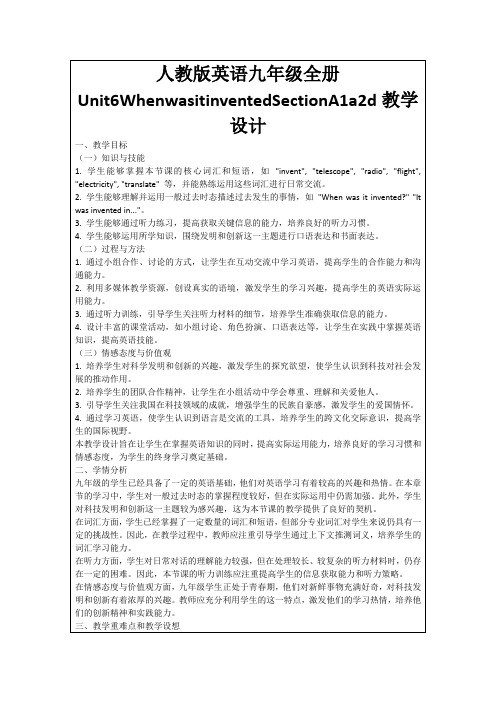
-学生在听力训练中,对细节信息的捕捉和推理能力的提升。
2.过程与方法方面的重难点:
-如何引导学生通过合作学习,提高口语表达和书面表达能力。
-如何设计有效的课堂活动,让学生在实践中掌握英语知识。
3.情感态度与价值观方面的重难点:
-培养学生对于科技发明的兴趣,以及对于创新精神的重视。
-结合我国科技发展的实际案例,激发学生的民族自豪感。
-引导学生探讨科技发明对生活的影响,培养他们的创新意识和实践能力。
四、教学内容与过程
(一)导入新课
1.教师通过展示一张包含各种发明物品的图片,如电话、电视、电脑等,引发学生对发明创造的思考,激发学生的学习兴趣。
-提问:“Can you guess what these things are? How do you think our lives would be without these inventions?”
2.学生分享他们对发明的认识和看法,教师总结并引出本节课的主题:“When was it invented?”
3.教师通过播放一段关于发明历史的短视频,让学生了解人类发明创造的伟大历程,为新课的学习做好铺垫。
(二)讲授新知
1.教师带领学生学习本节课的核心词汇和短语,如"invent", "telescope", "radio", "flight", "electricity", "translate"等,通过例句、图片和实物展示等方式,帮助学生理解和记忆。
(三)情感态度与价值观
1.培养学生对科学发明和创新的兴趣,激发学生的探究欲望,使学生认识到科技对社会发展的推动作用。
Unit+6 When+was+it+invented 英语人教版九年级全一册

7.【湖南人文】You won't find it fun uunntitlil you visit the ancient town,Pho enix in the West of Hunan provBiblioteka nce for yourself.
三、英汉互译。 1.Without doubt,reading is especially important for a child in the process of growing up. 毫毫无无疑疑问问,,读读书书对对在在成成长长过过程程中中的的孩孩子子来来说说尤尤为为重重要要。。 2.珍妮在花园意外地找到了她的手表。 JJeennnnyyfofouundndhehrewr awtcahtchbybayccaicdceindteinnttihne tghaerdgeanr.den.
4.daily adj.每日的;日常的 daily相当于 everyday。daily life意为“日常生活”。 5.list的用法 (1)用作动词,意为“列表;列清单”。 (2)用作名词,意为“名单;清单”,其常用短语:make a list,意为“列清 单”。
6.the style of the shoes鞋的样式 style作名词,意为“样式;款式;方式;作风”。the style of…意为“……的 样式/风格”。
4.take place发生(指按计划发生)。 5.doubt的用法 (1)作动词时,意为“怀疑”,后跟if,whether或that从句。 (2)作名词时,意为“疑惑;疑问”,常用短语为without/no doubt(毫无疑问; 的确)。
6.remain的用法 (1)作实义动词,意为“逗留;不离去”。 (2)作连系动词,其后跟形容词、名词、分词等,意为“仍然是;保持(某 种状态)”。
人教版九年级英语 Unit 6 When was it invented知识要点

人教版九年级英语Unit6 When was it invented?知识要点语法:1、被动语态(1). 被动语态表示句子的主语是谓语动词所表示的动作承受者。
(2). 被动语态基本结构:be+及物动词的过去分词(如果是不用物动词,其过去分词应带有相应的介词)(3). 被动语态中的be 是助动词,有人称、数和时态的变化。
一般现在时被动语态为:am/is/are+过去分词一般过去时被动语态为:was/were+ 过去分词与情态动词连用的被动语态:情态动词+ be + 过去分词(4). 被动语态中动作的发出者或执行者做介词by的宾语,放在句末,by 表示“由,被”的意思2、如何理解被动语态?为更清晰、更深刻地理解被动语态的含义,可以将主动语态和被动语态的句子结构进行比较。
主动语态:主语+ 谓语动词+ 宾语+ 其他成分被动语态:主语+ be +过去分词+ by +宾语+其他成分如:被动语态English is spoken by many people.课文知识要点:1、When was it invented?它是什么时候发明的?invent v. 发明→inventor n. 发明家→invention n. 发明可数名词invent v. “发明”指发明创造出自然界本来不存在的东西,如工具、方法、手段、汽车、电器、合成材料等。
Bell invented the telephone. 贝尔发明了电话。
Smith invented a new teaching method. 史密斯发明了一种新的教学方法。
Edison, a great inventor, invented over 1’000 inventions all his life.2、What is it used for?它是用来做什么的?be used for“用来做…”;此短语中的for是介词,表示用途,后接名词或动词-ing形式。
人教版九年级英语Unit 6 When was it invented 教案
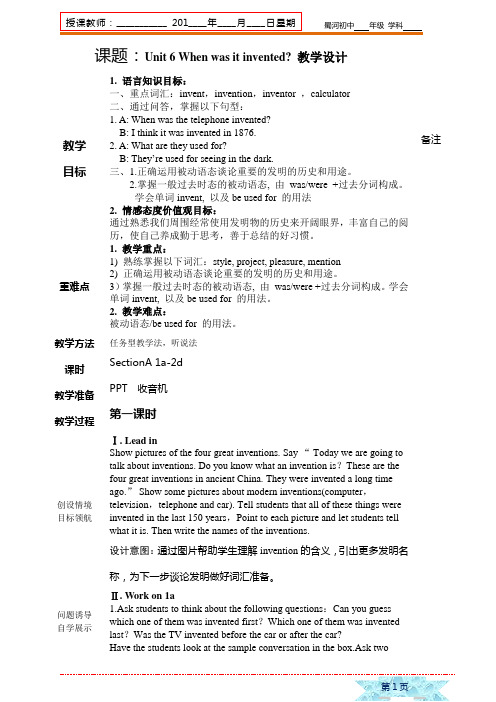
课题:Unit 6 When was it invented? 教学设计教学目标1. 语言知识目标:一、重点词汇:invent,invention,inventor ,calculator二、通过问答,掌握以下句型:1. A: When was the telephone invented?B: I think it was invented in 1876.2. A: What are they used for?B: They’re used for seeing in the dark.三、1.正确运用被动语态谈论重要的发明的历史和用途。
2.掌握一般过去时态的被动语态, 由was/were +过去分词构成。
学会单词invent, 以及be used for 的用法备注2. 情感态度价值观目标:通过熟悉我们周围经常使用发明物的历史来开阔眼界,丰富自己的阅历,使自己养成勤于思考,善于总结的好习惯。
重难点1. 教学重点:1) 熟练掌握以下词汇:style, project, pleasure, mention2) 正确运用被动语态谈论重要的发明的历史和用途。
3)掌握一般过去时态的被动语态, 由was/were +过去分词构成。
学会单词invent, 以及be used for 的用法。
2. 教学难点:被动语态/be used for 的用法。
教学方法任务型教学法,听说法课时SectionA 1a-2d 教学准备PPT 收音机教学过程第一课时创设情境目标领航Ⅰ. Lead inShow pictures of the four great inventions. Say “ Today we are going to talk about inventions. Do you know what an invention is?These are the four great inventions in ancient China. They were invented a long time ago.” Show some pictures about modern inventions(computer,television,telephone and car). Tell students that all of these things were invented in the last 150 years,Point to each picture and let students tell what it is. Then write the names of the inventions.设计意图:通过图片帮助学生理解invention的含义,引出更多发明名称,为下一步谈论发明做好词汇准备。
九年级英语全册 Unit 6 When was it invented?知识点总结 (新版)人教新目标版
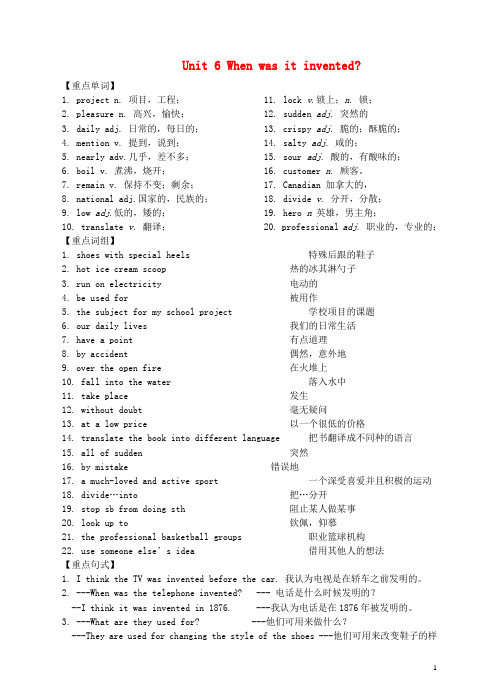
Unit 6 When was it invented? 【重点单词】1. project n. 项目,工程;2. pleasure n. 高兴,愉快;3. daily adj. 日常的,每日的;4. mention v. 提到,说到;5. nearly adv.几乎,差不多;6. boil v. 煮沸,烧开;7. remain v. 保持不变;剩余;8. national adj.国家的,民族的;9. low adj.低的,矮的;10. translate v.翻译;11. lock v.锁上;n. 锁;12. sudden adj. 突然的13. crispy adj. 脆的;酥脆的;14. salty adj.咸的;15. sour adj.酸的,有酸味的;16. customer n.顾客。
17. Canadian 加拿大的,18. divide v.分开,分散;19. hero n英雄,男主角;20. professional adj. 职业的,专业的;【重点词组】1. shoes with special heels 特殊后跟的鞋子2. hot ice cream scoop 热的冰其淋勺子3. run on electricity 电动的4. be used for 被用作5. the subject for my school project 学校项目的课题6. our daily lives 我们的日常生活7. have a point 有点道理8. by accident 偶然,意外地9. over the open fire 在火堆上10. fall into the water 落入水中11. take place 发生12. without doubt 毫无疑问13. at a low price 以一个很低的价格14. translate the book into different language 把书翻译成不同种的语言15. all of sudden 突然16. by mistake 错误地17. a much-loved and active sport 一个深受喜爱并且积极的运动18. divide…into 把…分开19. stop sb from doing sth 阻止某人做某事20. look up to 钦佩,仰慕21. the professional basketball groups 职业篮球机构22. use someone else’s idea 借用其他人的想法【重点句式】1. I think the TV was invented before the car. 我认为电视是在轿车之前发明的。
人教版2020学年九年级英语全册 Unit 6 When was it invented背诵卷 (新版)人教新目标版

Unit6(P41) 1. ①发明 (v.)________(n.) 发明家________②由某人发明________________③电话什么时候被发明?__________________________ ④这项发明是由这个发明家发明的________________________2.邀请(v.) ________ (n.) ____________被邀请做某事________________________________(P42)1.有灯的鞋子. 2.靠电力驱动. 3.改变鞋子的样式.4.我知道许多改变世界的小发明.5.你能帮我想出一种发明? 6.乐意效劳. 7.愉快(n.) (adj.)人物对某人满意乐意去干某事8.如此棒的一项发明(2种). 9.在我们的日常生活中. 10.你似乎很有道理.11.seem的三种用法.12.在那时,它没有被广泛的使用. 13.被用来做某事(2种). 14.①被热情招待②热情的服务(P43)1.一个偶然的发明. 2.偶然的(adj.) 意外(n.)3.偶然.4.被首次饮用. 第一个做某事的人5.据说.6.第一个发现茶将其作为一种饮料的人.据说一个叫神农的中国统治者是第一个发现茶将其作为一种饮料的人 7.煮饮用水. 8.在户外的篝火上. 9.落到水里. 10.停留在那儿一段时间.____________ 11.散发出一股香味. 保持伫立/坐着(的状态) .12.世界上最受喜爱的饮料之一被发明了. 13.几千年以后(用于过去时). 14.这本书描述了怎样种茶以及制作茶.15.人们相信… 16.被带到韩国. 17.茶没有出现知道1660年.18.从中国到西方国家的茶贸易发生在十九世纪.19.茶的普及. 20.传播…到… 21.毫无疑问.(P44)1.以低/高价. 2.(被)卖完 .3.卖得好.4.从…偷…5.建议某人(不要)做某事被建议不要做某事 6.把…翻译成…被翻译成…7.突然(短语) (adv.) 8.一个安全的地方.9.安全(adj.) (n.) (adv.) 10.地震突然发生,但是幸运的是村民被带到一个安全的地方.11.被告诉不要做某事. 12.破坏规则反义短语遵守规则 13.音乐音乐家(n.) 音乐的(adj.).14.写出下列动词的过去式和过去分词eat—— ring—— break——tell—— bring—— steal——sell—— say—— drink——fall—— take—— taste ——believe—— spread—— mention——invent—— use—— remain——appear—— drop—— trade——(P45)1.错误地 ,犯错. 很抱歉我错拿了你的笔___________________2.不够薄.3.盐 .咸的.4.使顾客开心.5.最后.6.…的历史.7.一个叫George的厨师. 8. 他烹饪了他们很长时间直到变脆.9.你知道薯条是错误的被发明的吗?(P46)1.你知道篮球是什么时候被发明的吗?2.历史上第一次篮球比赛.3. 一个名叫…的加拿大医生..4.被要求想出一个游戏. 想出5.在硬地板上.6.把…分成…被分成…7.同时. 8.阻止某人做某事(3种).9.篮球的普及. 10.梦想着做某事(2种). 11.不仅…而且…. 不仅我,而且她也喜欢弹钢琴她不仅喜欢英语而且还很擅长英语她不仅意识到了环保的重要性,而且还想采取行动帮忙拯救地球。
人教版英语九年级Unit6 When was it invented?全单元知识点讲解
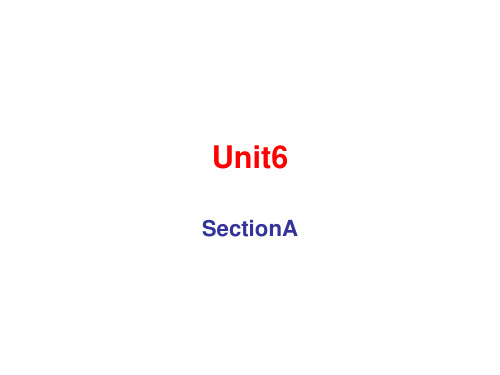
The teacher came in with a smile on
his face.
面带微笑
• project n.项目;工程
• pleasure n.高兴;愉快 eg:Reading gives me much pleasure.
常用短语:My pleasure./It's a /my pleasure./With pleasure.(很乐意/荣幸)
注意:Don't mention it. 用于口语,主要来 回答感谢,有时也用来回答道歉。
➢---Thank you very much. ---Don't mention it.不客气/不要这样说
➢---I'm sorry to trouble you. ---Don't mention it.没关系
daily English=daily English日常英语 adv.每天;每日=every day 作状语
eg:He comes here daily/every day. 拓展:daily n.日报
People's Daily《人民日报》 China Daily 类似的词:weekly adj.每周的 adv.一周一次
2.Well,you do seem to have a point... “do (does, did) + 动词原形”表示强调。 意为“确实;务必;一定;的确”。
eg:He d__o_e_s_come from America. 他的确来自美国。
I _d_i_d__call you yeaterday. 昨天我确实给你打电话了。
• pioneer n.先锋;先驱 China Young Pioneers中国少年先锋队
人教版九年级英语Unit-6-When-was-it-invented-教案

Unit 6 When was it invented?一.教材分析本单元涉及内容是本书当中比较重要的一部分。
被动语态结构及运用是教学中一个难点和重点,也是学生比较不容易理解的部分,因为它是建立在各种时态之上的。
另外通过对我们熟悉经常使用的发明物的历史来开阔眼界,丰富学生的阅历,使学生养成勤于思考,善于总结的好习惯。
二、教学目标1)知识目标扩容新单词,提高阅读能力。
理解和良好运用被动语态。
2)技能目标能谈论重要发明的历史及用途,能针对各项发明的用处及特点,发表自己的看法,并说明理由。
3)情感目标使学生懂得人类的科学发明创造了丰富的物质文明。
培养学生的创造发明的能力和愿望三、教学重点掌握一般过去时的被动语态四、教学难点弄清主动语态与被动语态的差异,通过练习和运用加以巩固五、教法运用本单元主要采用任务型教学。
在本课的任务型语言教学中,我将依据课程的总体目标并结合教学内容,创造性地设计贴近学生生活实际的任务活动,吸引和组织他们积极参与,使学生通过观察、思考、讨论、交流和合作等方式,在一种自然、真实或模拟真实的情境中体会语言、掌握语言的应用。
六、教学手段1)多媒体辅助:使用自制的课件,使抽象的语言变得直观,为学生运用英语进行交际创设情景,实现师生互动,生生互动和人机互动的多向交流。
2)非测试性评价:重视形成性评价,充分发挥其积极作用,促进新的评价体系的形成。
因此,本课我将各种活动设计成小组活动并开展小组竞赛和填写课堂自我评价表等非测试性评价手段,帮助学生学会自主学习,学会与人合作,培养创新意识以及具备科学的价值观。
七、教学效果预测;1.能够掌握被动语态,并运用到一定的语言环境。
2.通过多媒体和任务的完成学生会突破难点,产生一定创造精神。
3.能完成教学目标,调动学生学习热情。
八、课时安排:6课时九、教学程序Period One Section A 1 (1a-2d)一、教学目标:1. 语言知识目标:1) 能掌握以下单词: heel, scoop, electricity, style, project, pleasure, zipper,daily, website, pioneer, list, mention能掌握以下句型:①—When was the telephone invented?—I think it was invented in 1876.②—What are they used for? —They are used for seeing at night.2) 能谈论物品被发明的时间、发明者,表达某发明的用途。
人教版九年级英语《Unit 6 When was it invented?》教学设计

人教版九年级英语《Unit 6 When was it invented?》教学设计一. 教材分析人教版九年级英语《Unit 6 When was it invented?》主要介绍了与日常生活相关的科学技术发明的历史。
本单元包括一般过去时的被动语态,以及表示过去某段时间经常发生的动作或存在的状态的用法。
本节课旨在让学生掌握一般过去时的被动语态,能够运用本课所学内容进行交流。
二. 学情分析九年级的学生已经具备了一定的英语基础,能够听、说、读、写简单的英语句子。
但部分学生在语言表达方面仍有困难,需要教师的耐心引导和鼓励。
此外,学生对于科技发明的历史知识了解有限,需要在教学过程中进行补充。
三. 教学目标1.知识目标:–掌握一般过去时的被动语态。
–了解与日常生活相关的科学技术发明的历史。
2.能力目标:–能够运用一般过去时的被动语态进行交流。
–提高学生的听说读写能力。
3.情感目标:–激发学生对科学技术发展的兴趣。
–培养学生的创新意识。
四. 教学重难点•一般过去时的被动语态。
•与日常生活相关的科学技术发明的历史。
•一般过去时的被动语态的运用。
•对科学技术发明历史的理解。
五. 教学方法1.情境教学法:通过设定情境,让学生在实际语境中学习、运用英语。
2.交际法:引导学生进行互动交流,提高口语表达能力。
3.任务型教学法:通过完成任务,培养学生综合运用英语的能力。
4.启发式教学法:引导学生主动思考,激发学习兴趣。
六. 教学准备1.教材:人教版九年级英语《Unit 6 When was it invented?》。
2.辅助材料:科技发明历史的相关图片、视频等。
3.多媒体设备:投影仪、电脑等。
4.教学卡片:一般过去时的被动语态的句子。
七. 教学过程1.导入(5分钟)利用图片或视频介绍科学技术发明的历史,激发学生的兴趣。
引导学生谈论自己了解的科技发明,复习一般过去时。
2.呈现(10分钟)展示本节课的主要内容,引导学生关注一般过去时的被动语态。
人教版初中英语九年级全册Unit6Whenwasitinvented教学设计
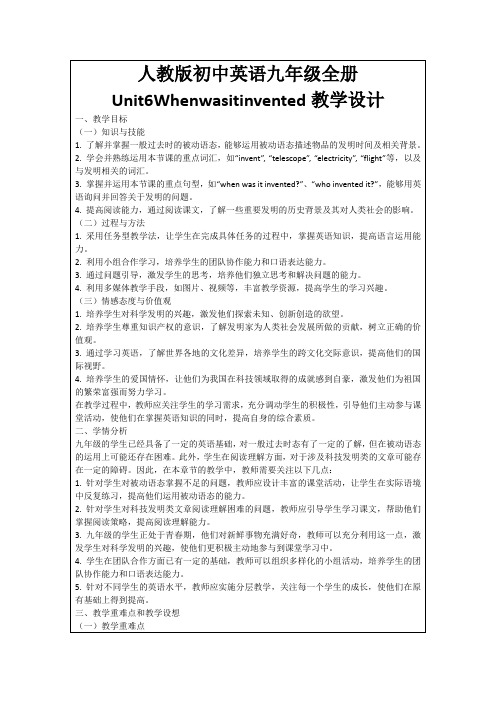
3.九年级的学生正处于青春期,他们对新鲜事物充满好奇,教师可以充分利用这一点,激发学生对科学发明的兴趣,使他们更积极主动地参与到课堂学习中。
4.学生在团队合作方面已有一定的基础,教师可以组织多样化的小组活动,培养学生的团队协作能力和口语表达能力。
2.利用小组合作学习,培养学生的团队协作能力和口语表达能力。
3.通过问题引导,激发学生的思考,培养他们独立思考和解决问题的能力。
4.利用多媒体教学手段,如图片、视频等,丰富教学资源,提高学生的学习兴趣。
(三)情感态度与价值观
1.培养学生对科学发明的兴趣,激发他们探索未知、创新创造的欲望。
2.培养学生尊重知识产权的意识,了解发明家为人类社会发展所做的贡献,树立正确的价值观。
c.采用问题链的形式,引导学生深入阅读课文,通过提问、讨论等方式,帮助学生理解课文内容,并培养他们的批判性思维。
d.创设互动式学习环境,鼓励学生提问和分享,使课堂成为知识交流的平台。
2.教学步骤设想:
a.导入新课:通过展示一些发明物品的图片,激发学生的兴趣,引导他们猜测这些物品的发明时间,自然引入被动语态的学习。
人教版初中英语九年级全册Unit6Whenwasitinvented教学设计
一、教学目标
(一)知识与技能
1.了解并掌握一般过去时的被动语态,能够运用被动语态描述物品的发明时间及相关背景。
2.学会并熟练运用本节课的重点词汇,如“invent”, “telescope”, “electricity”, “flight”等,以及与发明相关的词汇。
3.课后作业设想:
a.设计与课堂活动相关的作业,如让学生选择一ห้องสมุดไป่ตู้发明物品,用英语介绍其发明时间、发明者等,强化学生对被动语态的应用。
九年级英语全册Unit6Whenwasitinvented知识讲解及练习素材
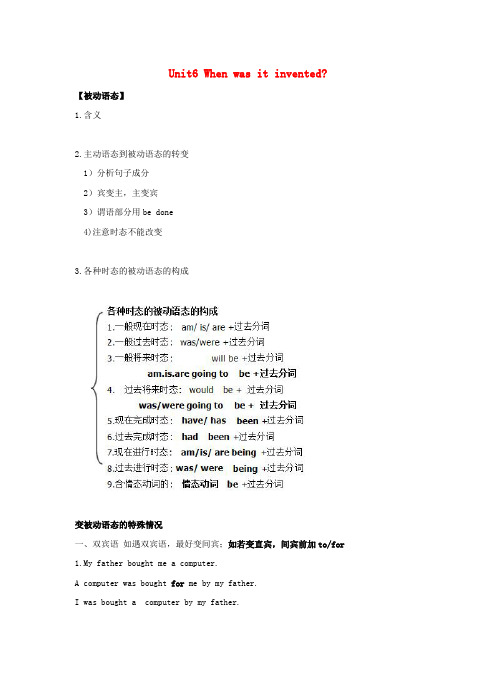
Unit6 When was it invented? 【被动语态】1.含义2.主动语态到被动语态的转变1)分析句子成分2)宾变主,主变宾3)谓语部分用be done4)注意时态不能改变3.各种时态的被动语态的构成变被动语态的特殊情况一、双宾语如遇双宾语,最好变间宾;如若变直宾,间宾前加to/for1.My father bought me a computer.A computer was bought for me by my father.I was bought a computer by my father.2.He gives me a book.A book is given to me by him.I am given a book by him二、无to不定式变为被动时加上to 感官动词真奇怪,被动语态to回来。
We often see him play basketball.He is often seen to play basketball by us.The boss made the children work for long.The children were made to work for long by the boss.三、注意动词短语的完整性take care of/look after/listen to/speak toThe old should be spoken to politely.The baby is taken good care of by the nurse四、不及物动词及系动词无被动语态happen /take place/ die/ rise /come true/ come out/run out被动语态练习一、将下列句子变为被动语态,每空一词。
1.We can finish the work in two days.The work _____ _____ _____ in two days.2.They produce silk in Suzhou.Silk ____ ______ in Suzhou.3.The children will sing an English song.An English song ____ ____ ___ by the children.4.I have given this book to the library.This book ___ ____ ____ to the library.5.Did they build a bridge here a year ago?____ a bridge ____ here by them a year ago?6.We'll put on an English play in our school.An English play ____ ____ _____ on in our school.7.More and more farmers buy color TV sets.Color TV sets ___ ___ ___ more and more farmers.8.We must water the flowers every day.The flowers must ___ ___ (by us) every day.9.They use knives for cutting things.Knives ___ ___ for cutting things.10.You can dig a hole in the earth.A Hole ____ ____ _____ in the earth.二、用动词的正确语态填空。
人教版九年级英语Unit 6 When was it invented。全单元教案
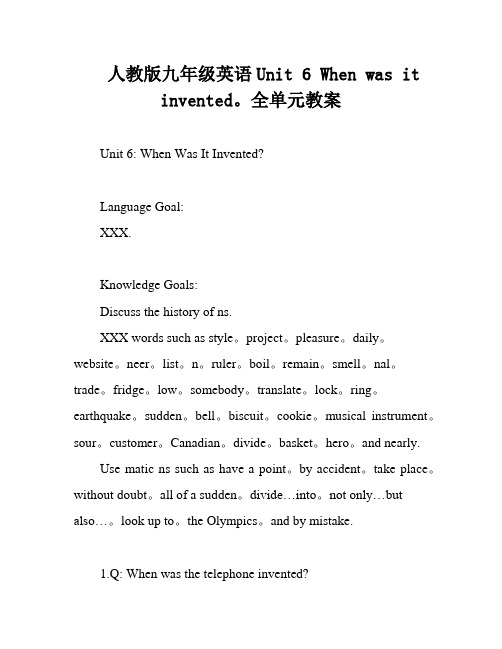
人教版九年级英语Unit 6 When was itinvented。
全单元教案Unit 6: When Was It Invented?Language Goal:XXX.Knowledge Goals:Discuss the history of ns.XXX words such as style。
project。
pleasure。
daily。
website。
neer。
list。
n。
ruler。
boil。
remain。
smell。
nal。
trade。
fridge。
low。
somebody。
translate。
lock。
ring。
earthquake。
sudden。
bell。
biscuit。
cookie。
musical instrument。
sour。
customer。
Canadian。
divide。
basket。
hero。
and nearly.Use matic ns such as have a point。
by accident。
take place。
without doubt。
all of a sudden。
divide…into。
not only…but also…。
look up to。
the Olympics。
and by mistake.1.Q: When was the telephone invented?A: I believe it was invented in 1876 by Alexander Graham Bell.2.Q: Was the TV invented before or after the car?A: There is some doubt about this。
but it is generally accepted that the car was invented before the TV.3.Q: Who invented the zipper?A: XXX XXX.4.Q: What is a hot ice-cream scoop used for?A: A hot ice-cream scoop is used for serving really cold ice-cream.5.XXX was invented by Alexander Graham Bell in 1876.Passive voice can be used to talk about ns。
九年级英语:Unit_6_When_was_it_invented____短语及综合测试题
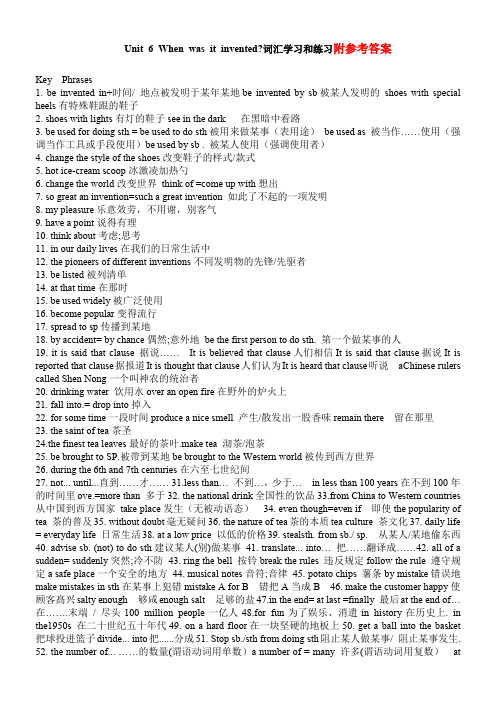
Unit 6 When was it invented?词汇学习和练习附参考答案Key Phrases1. be invented in+时间/ 地点被发明于某年某地be invented by sb被某人发明的shoes with special heels有特殊鞋跟的鞋子2. shoes with lights有灯的鞋子see in the dark 在黑暗中看路3. be used for doing sth = be used to do sth被用来做某事(表用途)be used as 被当作……使用(强调当作工具或手段使用)be used by sb . 被某人使用(强调使用者)4. change the style of the shoes改变鞋子的样式/款式5. hot ice-cream scoop冰激凌加热勺6. change the world改变世界think of =come up with想出7. so great an invention=such a great invention 如此了不起的一项发明8. my pleasure乐意效劳,不用谢,别客气9. have a point说得有理10. think about考虑;思考11. in our daily lives在我们的日常生活中12. the pioneers of different inventions不同发明物的先锋/先驱者13. be listed被列清单14. at that time在那时15. be used widely被广泛使用16. become popular变得流行17. spread to sp传播到某地18. by accident= by chance偶然;意外地be the first person to do sth. 第一个做某事的人19. it is said that clause 据说…… It is believed that clause人们相信It is said that clause据说It is reported that clause据报道It is thought that clause人们认为It is heard that clause听说aChinese rulers called Shen Nong一个叫神农的统治者20. drinking water 饮用水over an open fire在野外的炉火上21. fall into.= drop into掉入22. for some time一段时间produce a nice smell 产生/散发出一股香味remain there 留在那里23. the saint of tea茶圣24.the finest tea leaves最好的茶叶.make tea 沏茶/泡茶25. be brought to SP.被带到某地be brought to the Western world被传到西方世界26. during the 6th and 7th centuries在六至七世纪间27. not... until...直到……才…… 31.less than… 不到…,少于…in less than 100 years在不到100年的时间里ove.=more than 多于32. the national drink全国性的饮品33.from China to Western countries 从中国到西方国家take place发生(无被动语态)34. even though=even if 即使the popularity of tea 茶的普及35. without doubt毫无疑问36. the nature of tea茶的本质tea culture 茶文化37. daily life = everyday life 日常生活38. at a low price 以低的价格39. stealsth. from sb./ sp. 从某人/某地偷东西40. advise sb. (not) to do sth建议某人(别)做某事41. translate... into… 把……翻译成……42. all of a sudden= suddenly突然;冷不防43. ring the bell 按铃break the rules 违反规定follow the rule 遵守规定a safe place一个安全的地方44. musical notes音符;音律45. potato chips 薯条by mistake错误地make mistakes in sth在某事上犯错mistake A for B 错把A当成B 46. make the customer happy使顾客髙兴salty enough 够咸enough salt 足够的盐47.in the end= at last =finally 最后at the end of…在…….末端/ 尽头100 million people一亿人48.for fun为了娱乐、消遣in history在历史上. in the1950s 在二十世纪五十年代49. on a hard floor在一块坚硬的地板上50. get a ball into the basket 把球投进篮子divide... into把......分成51. Stop sb./sth from doing sth阻止某人做某事/ 阻止某事发生.52. the number of... ……的数量(谓语动词用单数)a number of = many 许多(谓语动词用复数)atthe same time 同时53. look up to钦佩;仰慕54.encourage sb. to do sth.鼓励某人做某事not only... but also... 不仅……而且…… e up with = think up 想出56.become an Olympic event成为一项奥运会项目the popularity of … …的流行,普及57.achieve one’s dreams 实现某人梦想58. dream of doing sth梦想干某事一选择题( ) 1.Mo Yan is famous _______ an excellent writer. And China is famous ______ culture.A. for; asB. as; forC. because; asD. as; for( ) 2. --When will A Bite of China II begin tonight?--It ________ for ten minutes.A. will beginB. has begunC. will be onD. has been on( ) 3. Sixteen-year-olds shouldn’t ______ to go to an Internet bar.A. be allowedB. be allowC. allowD. are allowed( ) 4. ---I’m not hungry but thirsty.---________A I’m hungry, too.B What about some cakes?C I’m happy to hear that.D How about a glass of water?( ) 5.— We can use QQ to talk with each other online.— Really? Could you please show me _______ it?A. what to doB. how to doC. when to doD. why to do( ) 6.As we know, _____of us likes pollution.A. no oneB. noneC. someoneD. nothing( ) 7.—Lily, _____ you _____ your ticket?—Not yet!A. did; findB. have; foundC. has; foundD. do; find( ) 8.When we went into the park, we were saw _____ Chinese Kungfu.A. playsB. played C .to play D. playing( ) 9.The invention was Wednesday afternoon.A. invented,inB. invented ,onC. inventing,of D, invent,for( ) 10. --------Remember this , children .________ you study,________ knowledge you will get.--------We know, Mr. Green.A. The harder, the lessB. The hard, the moreC. The harder, the moreD. harder, more( ) 11. Our teacher told us that the eartharound the sun.A. wentB. goC. goesD. would go( ) 12. Our classroom _____ every day, so it’s very clean.A. cleansB. is cleaningC. is cleanedD. cleaned( ) 13. Would you like to tell me _________next, Mr. Feng?A. what should we doB. we should do whatC. what we should doD. should we do what ( ) 14.——How is your grandma? ——She’s fine. She used to _____TV at home after supper. But now she is used to _____out for a walk.A. watch; goB. watching; goC. watching; goingD. watch; going( ) 15.Windows _________ glass,the paper ________ bamboo. A. be made of , be made ofB. are made of , is made ofC. are made of ,is made fromD. are made from., is made of( ) 16. — My dream is to build university on the moon some day.— It sounds likeunusual dream. I wish you could realize it.A. a; aB. an; aC. a; anD. an; an( ) 17. I didn’t think maths _______ important at that time.A. isB. wereC. areD. was( ) 18.nice glasses! Where did you buy them?A. HowB. What aC. WhatD. How( ) 19. Excuse me, would you please tell me ______buy a digital camera on line?A. what to B .how to C. what I can D. how can I( ) 20. Someone says, “Money is everything.” But I think time is _____ important than moneyA. muchB. lessC. much leastD. even more( ) 21 ____ Jack ____ Jim has been to to China, but ___ of them knows little about China in fact.A. Either; or; bothB. Neither; nor; bothC. Not only; but also; neitherD. Both;and; neither( ) 22.We don't know _________ he will come tomorrow._________ he comes,We 'll tell you.A.if;Whether B.whether;Whether C.if;That D.if;If()23.The knife is used ________ cutting.A.for B.as C.by D./()24.—I'm very________ with my own cooking. It looks nice and smells delicious.—Mm, it does have a ________ smell.A.pleasant; pleased B.pleased; pleased C.pleasant; pleasant D.pleased; pleasant ()25.The song came to my ears ________ accident.A.by B.with C.in D.for()26.The meeting ________ last Sunday night.A.happening B.happened C.took place D. takes place()27.Who were the zippers invented ________?A.by B.for C.with D.at()28.—Thanks for the delicious food. —________.A.No, thanks B.That's right C.All right D.My pleasure()29.The corn, potato and tomato are plants that were first ______ in America by Columbus.A.invented B.grown C.discovered D.found out()30.The car ________ by the policeman because the driver was drunk (喝醉的).A.stopped B.was stopped C.were stopped D.stops二完形填空Some years ago, Chinese high school students would show their school-bags, new clothes or new pens to their classmates when the new term started, Today, however, all have 1 .If you still come back to school 2 only these things, you are falling out-of-date(过时). Students in big cities like to bring the latest high-tech things to school, and feel happy and 3 to show off(炫耀) these things to_4_. Mobile phones, MP3 players, CD players, electronic dictionaries, the list is endless.Young people think that, living in the twenty-first century, they must keep up with the _5. They don’t want to fall 6_ . Besides, they think _7_ they need to keep in touch with their classmates, so they need mobile phones. They also like to _8_ the pop music, so they need CD players. They explain that, 9_ like electronic dictionaries, these can be _10 in their study, 11 . They think that their parents should understand 12_ they want these things.Foreign students will also bring some latest high-tech things when they 13to school at the beginning of a new term. _14_ , they often use the money which they made by themselves during the holiday to 15_ these high-tech things that they want.( ) 1. A. changed B. come C. joined D. stopped ( ) 2. A. to B. from C. of D. with( ) 3. A. right B. lucky C. nice D. pleased ( ) 4. A. other B. the other C. others D. he others( ) 5. A. times B. days C. years D. date ( ) 6. A. down B. off C. behind D. back( ) 7. A. that B. how C. if D. which ( ) 8. A. hear B. listen to C. read D. play( ) 9. A. look B. just C. feel D. something ( ) 10. A. new B. modern C. latest D. useful( ) 11. A. also B. too C. either D. then ( ) 12. A. where B. which C. what D. why( ) 13. A. return B. return back C. reach D. arrive ( ) 14. A. But B. However C.So D. Still( ) 15. A. borrow B. buy C. lend D. take三首字母填空。
人教版九年级英语 Unit 6 When was it invented Grammar
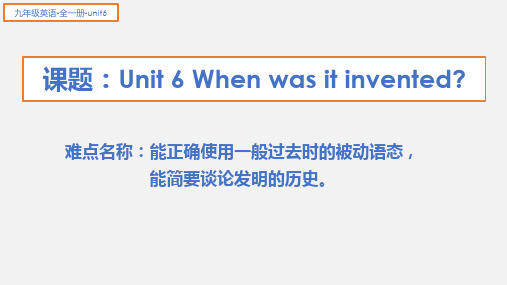
Thanks for listening!
The house was built by them last year.
The house wasn't built by them last year. Was the house built by them last year?
• He took good care of his sister yesterday.
九年级英语-全一册-unit6
课题:Unit 6 When was it invented?
难点名称:能正确使用一般过去时的被动语态, 能简要谈论发明的历史。
目录
CONTENTS
导入
知识讲解
课堂练习
小结
导入
Do you know what these inventions are?
the first car
知识讲解
被动语态的几种句型
难点突破
1 肯定句 主语 + be + 过去分词 + (by…)
A sweet song was sung by her on the stage.
2 否定句 主语 + be + not +过去分词 + (by…)
A sweet song wasn’t sung by her on the stage. 3 一般疑问句 Be + 主语 +过去分词 + (by…)?
His sister was taken good care of by him yesterday. His sister wasn't taken good care of by him yesterday.
人教版九年级英语 Unit6 When was it invented 重点知识精炼总结

2019-2020学年人教版九年级英语Unit6 When was it invented ?重点知识精炼讲解【短语归纳】1.by accident偶然;意外地by mistake 错误地;无意中2.divide …into把…分成…3.take place发生happen发生(没有被动形式)4. change the world改变世界5.all of a sudden=suddenly 突然;猛地6. My pleasure乐意效劳7. It is said that…据说……It is believe that…人们相信……;人们认为……8. drinking water 饮用水9. fall into掉入,掉进,fall off从……摔下来(fell fallen) 10. produce a nice smell 散发出一种清香11. without doubt 毫无疑问;12. at a low / high price 低/ 高价13. translate…into…把……译成14. in the end=at last=finally最后15. at the same time同时16. stop /keep/ prevent…from doing sth 阻止……做某事17. look up to 仰慕18. encourage sb. to do sth. 鼓励某人做某事19. dream of 梦想;梦见…20. achieve one’s dream / 实现梦想one’s dream comes true21. have a point 有道理22. not only…but also…不但……而且……23. the Olympics 奥林匹克运动会24. come up with 想出【单元知识点】1. invent v. 发明inventor n. 发明家invention n. 发明,可数名词2. be used for doing ,用来做…(是被动语态)(这个短语的考点有两点,一是used for的意思,二是for后面用动名词)Pens are used for writing. 笔是用来写的。
人教版九年级Unit6 When was it invented首字母填空

2019年人教版九年级上册Unit6 When was it invented?根据首字母或汉语提示完成单词第六单元1.Please l___the door when you leave.2.The students in every class are d___into eight groups.3.Tom, s____is waiting for you at the school gate.4.The temperature is l___. Please put on your coat.5.He set up a ____(网站)to help the disabled people.6.Many people lost their lives in the ____(地震).7.The wine has a pleasant s____.8.You are a h____in my heart.9.The names are l___on this piece of paper.10.The book has been t ____ into more than ten languages.11.Wu Mochou is famous. Her name is always m____by young people.12.Reading filled my life with p____.13.You can see clearly far away with this special i______.14.One c____ means a hundred years.15.After giving rose to others, fragrance r_____ with the hands.16.He put salt in her cup of tea by m____.17.He is without d____ the best student in our class.18.The T-shirt on sale has many popular s___ in the shop.19.At that time, she didn’t look like an scientific p____(先锋)20.These grapes are too s____, I can’t stand them.21.There are many c___ in the restaurant at noon.22.The man is a C___ doctor and he lives in Ottawa.答案:1.lock 2. Divided 3. Someone 4. low 5.website 6. earthquake 7.smell 8. hero9. listed10.translated11.mentioned12.pleasure13.instrument14.century15.remains 16.mistake17.doubt 18.styles19.pioneer20.sour 21.customers 22.Canadian。
- 1、下载文档前请自行甄别文档内容的完整性,平台不提供额外的编辑、内容补充、找答案等附加服务。
- 2、"仅部分预览"的文档,不可在线预览部分如存在完整性等问题,可反馈申请退款(可完整预览的文档不适用该条件!)。
- 3、如文档侵犯您的权益,请联系客服反馈,我们会尽快为您处理(人工客服工作时间:9:00-18:30)。
2019-2020学年人教版九年级英语
Unit6 When was it invented ?
重点知识精炼讲解
【短语归纳】
1.by accident偶然;意外地by mistake 错误地;无意中
2.divide …into把…分成…
3.take place发生happen发生(没有被动形式)
4. change the world改变世界
5.all of a sudden=suddenly 突然;猛地
6. My pleasure乐意效劳
7. It is said that…据说……It is believe that…人们相信……;人们认为……
8. drinking water 饮用水9. fall into掉入,掉进,fall off从……摔下来(fell fallen) 10. produce a nice smell 散发出一种清香11. without doubt 毫无疑问;
12. at a low / high price 低/ 高价13. translate…into…把……译成
14. in the end=at last=finally最后15. at the same time同时
16. stop /keep/ prevent…from doing sth 阻止……做某事17. look up to 仰慕18. encourage sb. to do sth. 鼓励某人做某事19. dream of 梦想;梦见…
20. achieve one’s dream / 实现梦想one’s dream comes true
21. have a point 有道理22. not only…but also…不但……而且……
23. the Olympics 奥林匹克运动会24. come up with 想出
【单元知识点】
1. invent v. 发明inventor n. 发明家invention n. 发明,可数名词
2. be used for doing ,用来做…(是被动语态)(这个短语的考点有两点,一是used for的意思,二是for后面用动名词)
Pens are used for writing. 笔是用来写的。
3. 给某人某样东西give sth. to sb. I gave a pen to him. 我给他一支笔。
give sb. sth. I gave him a pen. 我给他一支笔。
4. all day 整天
5. salty adj. 咸的salt n. 盐
6. by mistake 错误地(犯错是:make mistake,这些常见的短语大家务必要掌握)
I took the umbrella by mistake. 我不小心拿错了雨伞。
7. make sb./sth+形容词:使…怎么样It made me happy. 它使我高兴
make sb./sth+名词:让…做… It made me laugh. 它让我发笑
8. by accident 意外,偶然(常见短语,考的最多的是它的意思)
I met her by accident at bus stop. 我在公共汽车站意外地见到了她。
9. not…until… 直到…才…(重中之重,这个用法非常重要!经常出现在选择题中)
I didn't go to bed until I finished my work. 我直到完成我的工作才去睡觉。
10. according to +名词:根据… according to th is article根据这篇文章
11. over an open fire 野饮
12. leaf n. 叶子复数形式leaves
13. nearby adj. 附近的
14. fall into 落入,掉进The leaf fell into the river. 叶子落入了河里。
fall down 摔倒She fell down from her bike. 她从她自行车摔倒了。
15. quite 非常adv. 与冠词a连用时,冠词a必须放在它的后面
quite a beautiful girl 一个漂亮的女孩
16. in the way 这样
17. pleased adj. 表示外部因素引起人发自内心的欣慰和愉快
pleasant adj. 愉快,高兴。
指天气、时间、旅行令人高兴愉快
please v. 使高兴,使同意
18. battery-operated adj. 电池控制的,是名词+动词的运动分词构成的合成形容词
19. in the sixth century 在第6世纪
20. travel around 周游
21. more than == over 超过(相比较,more than更重要)
more than 300 == over 300:超过300
22. including . 包括。
可以与名词和动名词连用
Six people, including a baby, were hurt. 6个人包括一个小孩受伤了。
23. have been played 被上演,是现在完成时的被动语态,现在完成时的被动语态的结构:have /has been +过去分词。
24. be born 出生(常见短语)He was born in Canada. 他在加拿大出生
25. safety n. 安全safe adj. 安全的
26. knock into 撞上(某人)
27. divide sth. into … ,将…划分成,通常指将一个整体分成几个对应相对的部分
Let's divide ourselves into 4groups. 让我们把我们自己划成4组。
28. since then 自从那以后。
常与完成时态连用
Since then, I have left Beijing. 自从那以后,我已经离开了北京。
【语法归纳】
被动语态
(1)被动语态表示句子的主语是谓语动词所表示的动作承受者。
(2)被动语态基本结构:be+及物动词的过去分词(如果是不及物动词,其过去分词应带有相应的介词)
(3)被动语态中的be 是助动词,有人称、数和时态的变化。
一般现在时的被动语态为:am/is/are+过去分词
一般过去时的被动语态为:was/were+ 过去分词
与情态动词连用的被动语态:情态动词+ be + 过去分词(关于被动语态,大家一定要熟悉,这个在中考的时候属于是必考内容,而且是重点内容)(4)被动语态中动作的发出者或执行者做介词by的宾语,放在句末,by 表示“由,被”的意思,如何理解被动语态?
为了更清晰、更深刻地理解被动语态的含义,可以将主动语态和被动语态的句子结构进行比较。
主动语态:主语+谓语动词+宾语+其他成分
被动语态:主语+be+过去分词+by+宾语+其他成分
如:Many people speak English.
被动语态:English is spoken by many people.
作文
Computer
Computers are becoming more and more important in our daily life. Do you know when the computer was invented ?
The computer was invented in 1946. At that time , it was huge. With the development of science and technology, the computer has grown smaller. Now there are many kinds of computers, such as personal computers and laptops. The computer is a very useful tool in our life.
For example , it can send some messages to foreign friends by e-mail. What's more , it can share information with others through the World Wide Web. We can also listen to music or play the game on computers. It makes us relax.
It’s hard to imagine what our life would be like without computers. I think computers will be more convenient and they are going to change our life completely in the near future.。
